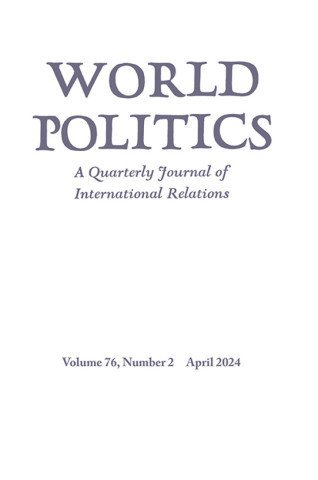Social Democracy and the Birth of Working-Class Representation in Europe
IF 4.5
1区 社会学
Q1 INTERNATIONAL RELATIONS
引用次数: 0
Abstract
abstract: Despite the growing interest in the economic backgrounds of mps in Western Europe, the evolution of working-class numerical representation before 1945 has not been systematically studied. Using data from England and Wales (1832–1944), Germany (1871–1930), and Norway (1906–1936), the authors show both that working-class mps were elected when barriers were lowered and that almost all working-class parliamentarians were affiliated with socialist parties. The authors further probe the conditions that determined the electoral success of workers using data about all candidates, constituencies’ occupational profile, and unionization in Norway between 1906 and 1936. They find that socialist parties nominated workers either in relatively uncompetitive elections in which unionization was high or in competitive races in which the party’s victory was possible but not guaranteed. Using information about mps in Germany and England and Wales, the authors find similar patterns. The article discusses the implications for research about democratization, the rise of social democracy, and the numerical representation of workers.社会民主主义与欧洲工人阶级代表权的诞生
摘要:尽管人们对西欧议员的经济背景越来越感兴趣,但 1945 年之前工人阶级数字代表权的演变却未得到系统研究。作者利用英格兰和威尔士(1832-1944 年)、德国(1871-1930 年)和挪威(1906-1936 年)的数据,表明工人阶级议员在门槛降低时当选,而且几乎所有工人阶级议员都隶属于社会主义政党。作者利用1906-1936年间挪威所有候选人、选区职业概况和工会组织的数据,进一步探究了决定工人选举成功的条件。他们发现,社会主义政党要么在工会化程度较高的相对缺乏竞争的选举中提名工人,要么在竞争激烈的选举中提名工人,在这些选举中,政党有可能获胜,但不能保证获胜。利用德国、英格兰和威尔士的议员信息,作者发现了类似的模式。文章讨论了民主化研究、社会民主的兴起以及工人代表人数的影响。
本文章由计算机程序翻译,如有差异,请以英文原文为准。
求助全文
约1分钟内获得全文
求助全文
来源期刊

World Politics
Multiple-
CiteScore
8.40
自引率
0.00%
发文量
24
期刊介绍:
World Politics, founded in 1948, is an internationally renowned quarterly journal of political science published in both print and online versions. Open to contributions by scholars, World Politics invites submission of research articles that make theoretical and empirical contributions to the literature, review articles, and research notes bearing on problems in international relations and comparative politics. The journal does not publish articles on current affairs, policy pieces, or narratives of a journalistic nature. Articles submitted for consideration are unsolicited, except for review articles, which are usually commissioned. Published for the Princeton Institute for International and Regional Affairs
 求助内容:
求助内容: 应助结果提醒方式:
应助结果提醒方式:


